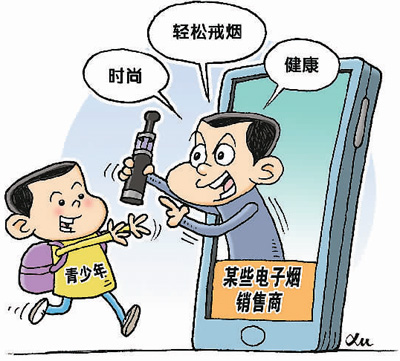It is strictly forbidden to upgrade the regulatory measures for online promotion of e-cigarettes in China.

Xinhua news agency

E-cigarette products on the shelves in Los Angeles, USA. Xinhua news agency
Regulatory measures against e-cigarettes have been upgraded again — — Recently, the State Tobacco Monopoly Bureau and the State Administration of Market Supervision issued a circular requesting that e-cigarettes should not be sold to minors, nor should e-cigarettes be sold through the Internet, nor should e-cigarette advertisements be published through the Internet.
Appear in a "healthy" appearance, but become the "first cigarette" for young people to become smokers — — For some time, electronic cigarettes, which are popular all over the world, have aroused vigilance and strict control in all countries. It is urgent to include e-cigarettes in the scope of tobacco control and prevent them from spreading to minors.
Not "healthy and harmless"
"Many friends around me are smoking. It is said that e-cigarettes are healthier, so I also tried." Zi Huan (a pseudonym), a 17-year-old high school student, came into contact with e-cigarettes for the first time because of the strong recommendation of his friends. He was originally resistant to cigarettes, but now he has become a small smoker who never leaves his hand.
E-cigarette is a special tobacco product, which generally consists of smoking utensils and cigarette oil. At present, the mainstream electronic cigarette in China, its cigarette oil is mainly made of nicotine, and nicotine and various additives are atomized by electronic smoking sets for consumers to smoke.
The reporter’s investigation found that many users of e-cigarettes said that they only "entered the hand" after seeing advertisements such as "can help quit smoking" and "healthy and harmless". The Report on E-cigarette Industry Supervision (2019) issued by Tsinghua University Public Health and Technology Supervision Research Group also points out that 95% of e-cigarette retail websites associate e-cigarettes with health and cleanliness, and 89% of online stores publicize health-related benefits.
This is not the case. The latest "Global Tobacco Epidemic Report 2019" released by the World Health Organization pointed out that e-cigarettes are "undoubtedly harmful", not only nicotine, but also other harmful substances, and the long-term impact on health is still unclear; There is not enough evidence that e-cigarettes help to quit smoking.
The relevant person in charge of the State Tobacco Monopoly Bureau also said that many e-cigarette companies mislead consumers with propaganda that goes against objective facts, such as "helping to quit smoking" and "being healthy and harmless", but most e-cigarettes are very arbitrary in raw material selection, additive use, process design and quality control, and there are serious quality and safety hazards such as unsafe ingredients, cigarette oil leakage and inferior batteries.
Experts point out that nicotine will seriously harm the nervous system of teenagers, and e-cigarettes "wear beautiful coats" to lure teenagers to smoke, which leads them to unconsciously become addicted to cigarettes and even have a great possibility of contacting traditional cigarettes. This trend is undoubtedly worrying.
Aim at young people
Although the notice has been issued for several days, the reporter found on Taobao, JD.COM and other e-commerce platforms that there are still many brands of e-cigarettes selling normally. Although the goods are clearly marked "E-cigarettes are forbidden for minors", the purchase process is not verified and minors can easily buy them.
At the same time, in the e-cigarette advertisements of the above-mentioned e-commerce platforms, there are frequent pictures of young people holding and smoking e-cigarettes, accompanied by text descriptions such as "it is good to smoke" and "natural harm reduction". In addition, these advertisements also implicitly reveal that e-cigarettes are not harmful to second-hand smoke and can improve the number of conversations among young people.
In this regard, the aforementioned Tsinghua University’s research report also pointed out that in advertising marketing, e-cigarettes are symbolized as consumer goods of the upper class, and represent independent personality and lifestyle. In cultural products, especially TV series and MV, e-cigarettes are associated with cheerful, relaxed and enjoyable atmosphere.
Relevant data is worthy of vigilance. In May 2019, the survey results released by China Center for Disease Control and Prevention showed that the people who used e-cigarettes were mainly young people, 15-mdash; The use rate of e-cigarettes in the 24-year-old group is 1.5%; The main way to obtain e-cigarettes is the internet; The proportion of people who have heard of e-cigarettes, used e-cigarettes and now use them has increased.
The reporter found on video platforms such as bilibili that there are many e-cigarette product evaluation and fancy smoke teaching videos, and many netizens exchanged their experiences and feelings in using e-cigarettes in video comments.
In addition to publicity and promotion, due to the lack of standards, the quality problem of e-cigarettes is equally prominent.
Mao Qun An, director of the Planning Department of National Health Commission, said that many e-cigarette products contain vague labels of nicotine concentration, which may easily lead to excessive consumption by users. At the same time, there are also safety risks such as battery explosion, smoke liquid penetration, high temperature burns and so on.
Strengthen supervision measures
Last August, the State Administration of Market Supervision and the State Tobacco Monopoly Bureau jointly issued a circular explicitly prohibiting the sale of e-cigarettes to minors. The latest measures have highlighted the strict requirements for Internet sales and promotion of e-cigarettes.
The circular requires that all kinds of market entities should not sell e-cigarettes to minors; Enterprises or individuals producing and selling e-cigarettes are urged to close e-cigarette Internet sales websites or clients in time, e-commerce platforms close e-cigarette shops and take off e-cigarette products in time, and enterprises or individuals producing and selling e-cigarettes withdraw e-cigarette advertisements published through the Internet.
At present, many countries in the world have completely banned or strictly restricted the sale of e-cigarettes, and more than 40 countries or regions have explicitly legislated or officially announced the ban on the sale of e-cigarettes.
In China, since this year, Shenzhen, Chengdu and other places have also revised the tobacco control regulations to include e-cigarettes in the scope of tobacco control: Shenzhen has clearly expanded the concept of "smoking" to use e-cigarettes and hold other tobacco products that are ignited or heated without burning; Chengdu also explicitly includes smoking electronic cigarettes in smoking behavior, and clearly stipulates that tobacco product operators are prohibited from selling tobacco products to minors; In its rail transit passenger code, Beijing has supplemented the prohibition of smoking electronic cigarettes … …
After the unrestrained barbaric growth, e-cigarettes are gradually fading away from the "electronic" stunt, highlighting its "smoke" nature. Yang Tingzhong, director and professor of Tobacco Control Research Center of Zhejiang University School of Medicine, believes that e-cigarettes should not have special status, but should be included in the restrictions of ordinary tobacco, and should be restricted in advertising, marketing and consumption places.
In this regard, many experts in the industry have called on the state to increase the research on e-cigarettes, introduce more comprehensive and detailed regulatory measures, and strengthen the protection of minors.
Multi-countries strictly control electronic cigarettes
■ USA
The U.S. Centers for Disease Control and Prevention recently reported that the cumulative number of deaths from lung diseases with unknown etiology and possible association with e-cigarettes has increased to 34. At present, Massachusetts has announced that it will suspend the sale of all electronic cigarette products and electronic cigarette devices, while New York prohibits the sale of scented electronic cigarettes.
■ India
The Indian government decided that e-cigarettes have reached "popularity" among young people and issued a ban on e-cigarettes in September this year. Those who violate the ban for the first time may be fined about $1,400 or imprisoned for one year, or both, while those who violate it for many times may face up to three years’ imprisonment and a fine of nearly $7,000. The Indian government believes that e-cigarettes are harmful to health and may damage the government’s tobacco control efforts.
■ Japan
Organizers of Tokyo 2020 Olympic Games announced in February this year that this Olympic Games and Paralympic Games will bid farewell to tobacco products and its derivative substitute "e-cigarette" completely. From this summer, schools, hospitals and government agencies in Tokyo will be banned from smoking indoors; From April next year, restaurants, bars, hotels and other business places will be banned in general, and smoking areas can still be designated.
■ Korea
South Korea’s Ministry of Health and Welfare recently advised people to stop using atomized e-cigarettes and promised to determine whether the sale of e-cigarettes should be banned as soon as possible. The person in charge of the country’s health department said, "Children, teenagers, pregnant women and patients with lung diseases should never use atomized e-cigarettes." According to Korean government data, as of June this year, e-cigarettes accounted for 13% of the sales in the Korean tobacco market.
■ Turkey
Turkish President Erdogan said recently that e-cigarette enterprises are not allowed to produce in Turkey, calling on Turks to "replace cigarettes with tea". In 2013, the Turkish government banned all alcohol and tobacco products from advertising, promotion and sponsorship.